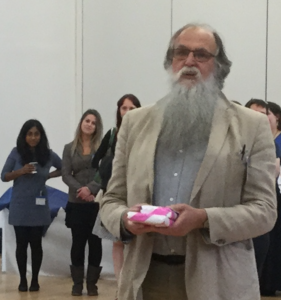We are deeply saddened to learn the news that Professor Peter Mack died suddenly on Thursday 5th October. He was a longtime member of the SRS and of SRS Council, and served diligently and thoughtfully as Chair from 2013-2016.
Peter graduated with an MA from Oxford, before earning his MPhil and PhD at the Warburg Institute and his DLitt from Warwick. He taught for many years at the University of Warwick, where he served as Head of the English Department and of the Arts Faculty. From 2010-2014, he was seconded to the Warburg, serving as Director of the Institute. Elected a Fellow of the British Academy in 2012, Peter was an internationally renowned and prolific scholar of Renaissance rhetoric & dialectic, medieval and Renaissance European literature, thought and cultural history. He was one of the foremost scholars of rhetoric and logic in Renaissance Europe of his generation, but he wore his learning lightly.
Our thoughts are first and foremost with Peter’s family, and with all his scholarly friends. We plan to remember him and his contribution to scholarship in Renaissance studies at a later date.
Below is Peter’s final ‘Letter From the Honorary Chair’, printed in The Bulletin of the Society for Renaissance Studies, 33:1 (April, 2016), 3.

When the gap between the wealth of the élite and the subsistence of the poor grows ever greater, and when power is overwhelmingly linked to money, it’s time for a five-hundredth anniversary rereading of Sir Thomas More’s Utopia. The absurd reality that most full-time employees have little prospect of buying a dwelling in a city in the southern half of the island without parental assistance makes the abolition of private property advocated by Raphael Hythloday in both halves of the book less unthinkable. By naming his main speaker as ‘purveyor of nonsense’, More warns us at the outset not to take everything he says literally. At the end of each part the figure representing ‘More’ in the dialogue expresses reservations as well as fascination.
Every reader will have a catalogue of unacceptable features of the Utopian political system: the surveillance, the slaves, the mercenaries, the foreign policy, the punishments. Some of these unlikeable and immoral features seem to result from More’s desire to explain in too much practical detail how the state could be defended without an army and an aristocracy, how sufficient food could be grown, stored and distributed, or how the problem of shirkers could be avoided. More favourable readings emphasize the comparative aspect of this exercise in imagining a state. The punishments are cruel by our standards but not as cruel as the sixteenth-century practice of killing people who steal. Remembering the idle rich of More’s day and their hangers-on may be an antidote to working out in too much detail ways of correcting idlers in a communist system. We need the English sections of the first half of the book to further our understanding of the Utopian idea.
Understandably the book was altered to begin with a portrayal of Hythloday. One would not easily tolerate listening to the projection of an ideal state from someone who had poisoned the ship he worked on or destroyed the life of a co-worker. Raphael Hythloday’s personality is interestingly at variance with the state he describes. In spite of his learning and the experience and knowledge he has acquired through travel he rejects the normal humanist aspiration of counselling a prince. So the advocate of communal living in the polity prefers himself a private life without the problem of reconciling differing interests or of interacting with people he considers unworthy. Perhaps the problem focused upon by the two parts of Utopia concerns the degree of privacy which is desirable and the ways in which this can be reconciled with the participation and welfare of everyone in society, and the placing of limitations on the wealth and privilege of those who accumulate most.
Utopia is both a precursor of science fiction and an antitype to it. In science fiction the narrative to some extent tests and critiques the strange society which is also described. This would have been an interesting task for More to have undertaken. And yet in much science fiction, however unlikeable the new world, the discovery of that world is the best part of the narrative. The action is less interesting. Someone leads a revolt; someone escapes; the place to which she escapes is scarcely better; much is left unresolved. Perhaps More felt that it was enough to display the alternative? Or perhaps he eventually agreed with Montaigne (in ‘On Vanity’, Essais III.9) that imagining the best form of society and laws is merely a mental exercise since in practice one has to work with people who are already fashioned and bound to particular customs.
Looking back on my three years chairing our society, remembering the excellence of the journal Renaissance Studies, looking back at the Southampton conference and looking forward to Glasgow, I’m struck with gratitude for the time and thought which people contribute to the organisation of the Society and to the study of the renaissance. And even more for the joyful and generous way in which people make those contributions. With such a community of workers the study of the renaissance will flourish in the next twenty years. Working with our membership and our council has been much more like the pleasure of seminar discussion with enthusiastic students than like the committee work of which we all now have too much. It reminds me more of the joyfulness of Rabelais’ Abbey of Theleme than the rigours of Patagonian Utopia, though I wish that Rabelais could have taken on More’s brief of imagining a society that would be just and happy for all and not only for the young élite.
Peter Mack
